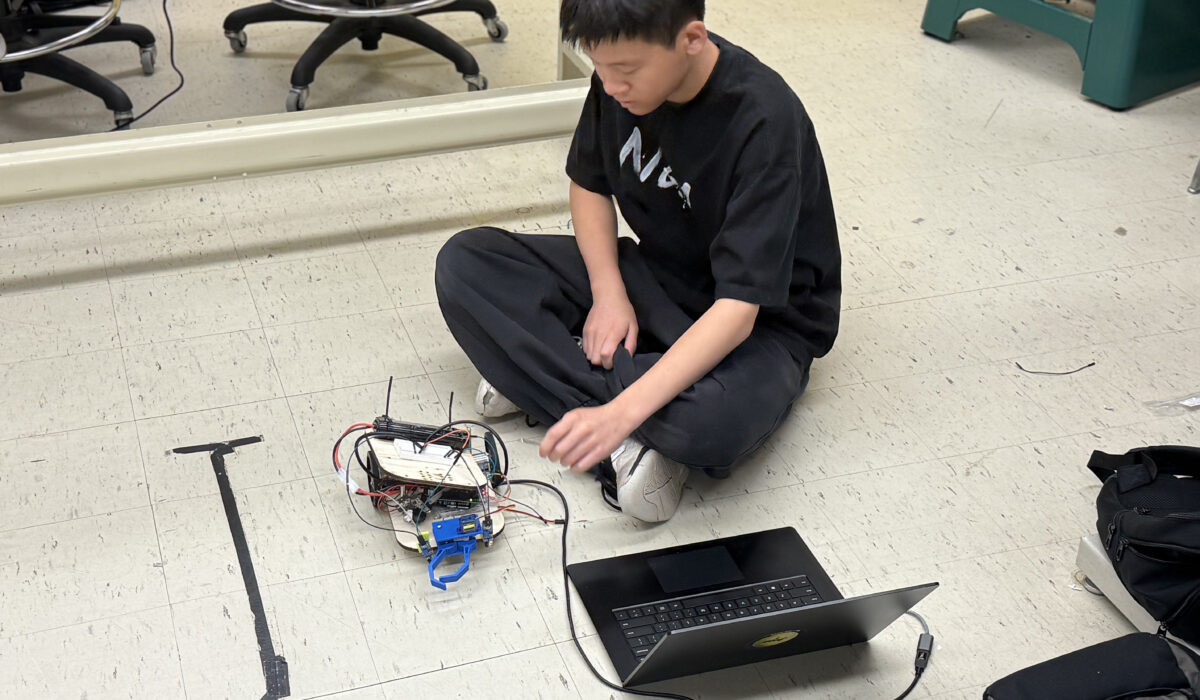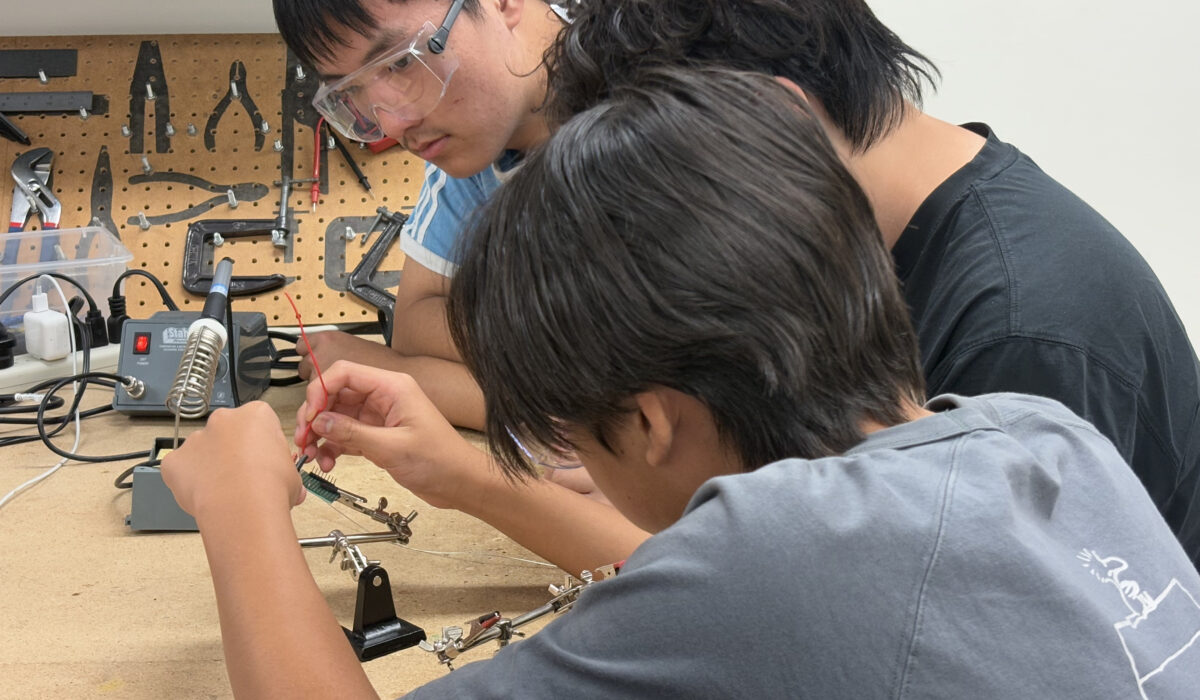Top 15 High School Summer Engineering Programs for Future Engineers
目录
Engineering Programs
For ambitious high school students passionate about science, innovation, and building the future, enrolling in an engineering summer program or class can be a game-changer. These immersive experiences help you explore engineering fields, gain hands-on skills, and strengthen your college and résumé profile. In this guide, we’ll highlight 15 of the most respected summer engineering programs for high schoolers—including one standout program at University of California, Irvine (UCI) focused on autonomous driving.
Why Summer Engineering Programs Matter So Much
For high school students who love building, coding, designing, or taking things apart just to see how they work, summer engineering programs are one of the most powerful ways to level up.
Unlike regular school classes, these summer classes put you inside university labs, expose you to real engineering tools and workflows, and match you with mentors who do this work every day. They help you:
Test whether engineering is really the right path for you
Build projects you can showcase in your college applications
Gain confidence working with hardware, software, circuits, CAD, or AI
Stand out in competitive STEM-heavy college admissions
What Makes a Great High School Engineering Program?
Not all engineering programs or summer classes are created equal. The ones that genuinely move the needle for your learning and your future usually share a few core traits:
1. Strong Academic + Practical Balance
Top programs go beyond lectures. They combine:
Short, focused lessons on core concepts
Labs and build sessions in real or simulated engineering environments
A final project that you design, test, iterate, and present
CollegeVine notes that the most impactful high school engineering summer programs give students “immersive, hands-on” experiences rather than just passive learning.
2. Real Mentorship and University Connection
Many of the best engineering programs are hosted on university campuses and are taught or supervised by:
Professors or lecturers
Graduate students or research engineers
Industry partners in robotics, aerospace, software or AI
This not only gives you exposure to cutting-edge work but also helps you understand what studying engineering in college really looks like.
3. Clear, Portfolio-Ready Deliverables
A strong program will leave you with something you can show:
A working robot
A coded control system
A CAD model or 3D-printed prototype
A research report or technical presentation
These outputs become powerful content for your Common App Activities, Additional Information, or even main essays.
4. Thoughtful Scope and Structure for High School Students
High school-friendly engineering programs:
Usually last 1–6 weeks
Are structured as residential camps, commuter programs, or intensive online summer classes
Provide age-appropriate project scopes while still pushing you beyond your comfort zone
Scholarships emphasizes that curriculum and guidance quality are just as important as brand name when comparing engineering camps.
With that context, let’s look at our #1 featured program—and then the rest of the top 15.
Top 15 High School Summer Engineering Programs
#1 – UCI 自动驾驶夏令营(UCI Autonomous Driving Summer Camp)
Program Snapshot
Host: University of California, Irvine (UCI), in collaboration with Franklin Education Foundation
Format: ~2-week intensive, on UCI campus (residential / local options)
Focus: Autonomous driving, robotics, embedded systems, AI & control
Students: High schoolers serious about engineering, AI, and robotics
The UCI 自动驾驶夏令营(UCI Autonomous Driving Summer Camp) stands out as our #1 program because it compresses a true end-to-end engineering experience into a focused, project-based summer class.
You don’t just “learn about” self-driving cars—you build and program one (a scaled, model-size version, of course).
What You Actually Do
Over the program, students typically:
Design & CAD
Use tools such as Onshape or similar CAD platforms to design the chassis and mounting components for sensors and control boards.
Learn basic mechanical design: stability, center of gravity, mounting points, and robustness.
Electronics & Hardware Integration
Assemble DC motors, motor drivers, batteries, and power systems
Wire up sensors such as infrared sensors, ultrasonic modules, or cameras to a microcontroller like Arduino
Learn practical skills like soldering, wiring safety, and debugging hardware connections
Embedded Programming (Arduino / C/C++)
Program basic motor control (forward, reverse, speed control through PWM)
Read and interpret sensor data
Implement decision logic for obstacle avoidance and line following
Autonomous Navigation & Algorithms
Implement algorithms for lane keeping and path following
Learn about PID control concepts (Proportional–Integral–Derivative) for smoother, more accurate control
Calibrate parameters and iterate circuitry and code to handle real-world noise and variation
Testing, Debugging & Engineering Iteration
Run your vehicle through test tracks that include curves, intersections, and obstacles
Collect data, observe behavior, and refine code, tuning, and physical design
Learn that iteration is the heart of real engineering
Final Presentation & Portfolio
Present your team’s vehicle, design choices, challenges, and solutions
Demonstrate your model autonomously navigating the track
Leave with photos, videos, and code repositories—ideal for college essays and STEM portfolios
Recent recap content from the camp highlights how students work with real UC Irvine labs, receive mentorship from faculty and industry engineers, and end the program with autonomous systems that “turn curiosity into capability.”

#2 – MITES Summer (MIT Introduction to Technology, Engineering & Science) – MIT
Host: Massachusetts Institute of Technology (MIT)
Duration: 6-week residential program
Cost: Free (fully funded for admitted students)
MITES Summer (formerly MITES) is one of the most prestigious STEM summer experiences in the world. It targets rising high school seniors interested in engineering and science, particularly from underrepresented communities.
Students take rigorous math, science, and electives, attend lab tours, and receive college admissions guidance. The engineering content is demanding and fast-paced, matching MIT’s overall academic culture. You won’t necessarily build a single big project like a robot, but you’ll be deeply immersed in high-level problem solving, technical thinking, and college-style coursework.
#3 – Stanford Pre-Collegiate Summer Institutes – Engineering
Host: Stanford University
Duration: Usually 2–3 weeks, residential
Focus: Intro to engineering, design thinking, robotics, biomedical, environmental, and more
Stanford’s engineering-focused summer classes allow high school students to explore multiple engineering disciplines. Programs typically combine:
Introductory lectures on engineering fields
Team-based design work
Exposure to topics like sustainability, biomedical design, civil infrastructure, and computer engineering
For students who want a broad survey of engineering rather than a single vertical like robotics or aerospace, Stanford’s pre-college engineering tracks are a strong option.
#4 – Caltech-Linked Young Investigators / Engineering Research Programs
Host: California Institute of Technology or partner institutes
Duration: Varies; often 3–6 weeks
Focus: Research-oriented engineering & applied science
Caltech-affiliated summer options tend to be small, intense, and research-centric. Students may assist in engineering or applied physics labs, running experiments and analyzing data under mentorship. These experiences are especially valuable for those leaning toward research careers or PhD pathways rather than purely industry.
#5 – Carnegie Mellon Summer Academy (SAMS) – Engineering & CS
Host: Carnegie Mellon University
Duration: ~5–6 weeks, residential
Focus: Engineering, computer science, mathematics
CMU’s summer academic programs often include project-based work in robotics, electrical engineering, and computing. Students benefit from access to CMU’s legendary robotics culture and strong emphasis on systems thinking and technical depth.
#6 – Johns Hopkins Engineering Innovation (EI)
Host: Johns Hopkins University
Format: In-person and sometimes online options
Focus: Civil, mechanical, electrical, and other engineering streams
Johns Hopkins EI places students in a college-style engineering course with labs and design challenges. Expect to:
Build small-scale engineering structures
Run stress tests
Interpret data and iterate designs
For students who want a structured, course-like experience where you earn a grade and something close to a “college class,” EI is a strong choice.
#7 – Georgia Tech Summer Engineering Institute
Host: Georgia Institute of Technology
Location: Atlanta, GA
Georgia Tech’s engineering summer programs introduce high school students to the kinds of problems real engineers solve: energy, transportation, system design, and more. You typically work on team projects, learn from GT faculty, and experience campus life in a leading engineering school.
#8 – Cornell Engineering Programs (Curie Academy / CATALYST)
Host: Cornell University
Focus: Engineering exploration, often with special emphasis on women in engineering (Curie) or underrepresented groups
Cornell’s programs mix lectures, lab visits, identity discussions and project work. You might design a simple medical device, structural component or computational tool. These programs are valuable for students who want both engineering and a strong community/mentorship experience.
#9 – UC Berkeley Summer Engineering / Pre-College Programs
Host: University of California, Berkeley
Berkeley offers multiple pre-college options, some specifically focusing on engineering, CS, and technology. Expect:
Lab experiences in robotics, circuits or programming
Introductory engineering analysis
Exposure to UC Berkeley faculty and campus
Students looking at UC engineering degrees benefit from getting a feel for the environment and expectations here.
#10 – UIUC WYSE (Worldwide Youth in Science & Engineering) Camps
Host: University of Illinois Urbana-Champaign
WYSE offers engineering camps that are often more accessible cost-wise while still leveraging a top-tier engineering college. Camps cover civil, mechanical, aerospace, and electrical engineering fundamentals and often feature:
Design projects
Lab tours
Team-based challenges
These are excellent for students seeking solid engineering exposure without ultra-elite selectivity.
#11 – Purdue Engineering Summer Program
Host: Purdue University
Purdue’s engineering camps emphasize design, build, test workflows. High school students may tackle bridges, robots, energy systems or embedded devices. Purdue’s deep connection with industry makes these experiences especially attractive for those who want practical, industry-aligned learning.
#12 – Notre Dame Introduction to Engineering
Host: University of Notre Dame
This program aims to introduce high school students to several engineering disciplines in a faith-informed, mission-driven environment. You’ll learn about engineering ethics, societal impact and technical problem-solving—great for students who value a holistic, values-based approach to engineering.
#13 – NYU Tandon Engineering & Applied Science Programs
Host: NYU Tandon School of Engineering
Located in Brooklyn, these programs often focus on urban technology, cybersecurity, robotics, and applied computing. Students experience:
Project-based courses
Urban systems problem-solving
Exposure to NYC’s tech environment
Ideal for students who want to combine engineering with city-scale challenges and innovation.
#14 – Columbia SHAPE (Summer High School Academic Program for Engineers)
Host: Columbia University, School of Engineering and Applied Science
Columbia SHAPE is a selective program that immerses high school students in engineering fundamentals plus modern topics like sustainability, data, and design. Students work on hands-on projects while also discussing ethics, societal impact and modern engineering issues.
#15 – University of Michigan Engineering Summer Academy
Host: University of Michigan – Ann Arbor
Michigan’s engineering programs for high school students connect you with one of the largest and most respected engineering colleges in the U.S. Camps may cover:
Electrical and computer engineering
Mechanical design and robotics
Aerospace or automotive engineering
This is especially compelling if you see yourself in the Midwest engineering ecosystem or are considering Michigan for college.

How to Choose the Best Engineering Summer Class for You
With so many choices, how do you pick the right engineering program or summer class?
Step 1: Clarify Your Engineering Interests
Ask yourself:
Am I more excited by robots and hardware (mechanical, electrical, robotics)?
Or by code and algorithms (CS, AI, software engineering)?
Or by big systems like bridges, planes, energy systems, cities (civil, aerospace, environmental)?
Different programs lean heavily in different directions. For example, UCI’s Autonomous Driving camp sits at the intersection of robotics + AI + embedded systems, while general pre-college programs (Stanford, Cornell, Berkeley) may give you a broader overview rather than a single deep dive.
Step 2: Evaluate Depth vs. Breadth
If you want deep mastery and one very strong portfolio project, choose something like UCI Autonomous Driving, MITES, or a research-style program.
If you want broad exploration, pick pre-college institutes where you sample several engineering fields.
Step 3: Consider Format, Cost, and Logistics
Residential vs commuter vs online
Program length (1 week vs 6 weeks)
Tuition and available scholarships / financial aid
Scholarships points out that there are both costly and more accessible engineering camps, and students should weigh outcomes against budgets.
Step 4: Look at Outcomes
Read about:
Final projects
Student testimonials and alumni trajectories
Whether students use their experience in college essays
Pick a program where you can clearly imagine saying, “This experience changed how I see engineering,” in your future personal statement.
How to Maximize Your Summer Engineering Experience
Getting into a great program is only half the battle. Making it count is where the magic happens.
Before the Program
Brush up on math: Algebra, functions, basic trigonometry and maybe calculus if applicable.
Learn basic coding: Python or C++ are great starting points. For UCI’s camp, any Arduino or robotics tutorials will pay off immediately.
Explore CAD tools: Try free platforms like Onshape to get comfortable with 3D modeling.
During the Program
Ask questions constantly—professors and mentors expect curiosity.
Take ownership of part of the project (sensor integration, CAD, data analysis, etc.).
Document everything: keep a lab notebook, take photos and short video clips of your build and test stages.
Network with peers; many of them will be future classmates or colleagues.
After the Program
Organize your project outputs into a portfolio: slides, code repo, short write-up, and demo video.
Update your résumé and LinkedIn (if you use it).
Use what you learned to continue building at home—join or start a robotics club, participate in competitions, or do independent projects.
Start drafting how this will appear in your college application:
What problem did you solve?
What challenge did you face?
How did you grow as an engineer and teammate?
FAQ: Engineering Programs & Summer Classes
What counts as a high school engineering summer program?
Any structured program where high school students spend part of the summer learning and applying engineering concepts—often at a university, research center, or reputable organization—with clear technical content, hands-on work and some level of academic rigor.
Are engineering summer classes really worth it?
If chosen wisely, yes. They can clarify whether engineering is the right path, build skills you won’t get in a typical classroom, and provide strong material for college applications.
How many programs should I do?
Quality > quantity. One or two strategically chosen programs, where you fully engage and produce meaningful work, is much more valuable than attending many shallow camps.
Do online engineering programs matter as much as in-person ones?
Well-designed online programs with real projects, mentorship and deadlines absolutely count. However, in-person programs offer the bonus of lab access and campus immersion. Choose what works best given your location and budget.
Do I need prior engineering experience to apply?
Not always. Some programs expect prior coursework or skills, but others are designed for beginners with strong curiosity and math basics. Read eligibility requirements carefully—UCI Autonomous Driving, for example, welcomes motivated students who may be new to advanced robotics but eager to learn quickly.
Will these programs guarantee college admission?
No single activity can guarantee admission, especially at ultra-selective schools. But a strong engineering summer program—especially with a serious project outcome—can significantly strengthen your overall profile and demonstrate authentic, sustained interest in STEM.
Turn Your Curiosity into Capability
Engineering isn’t a spectator sport—you learn it by doing. The right summer engineering program can turn abstract interest into concrete skills, real projects, and a clearer sense of who you want to become.
From ultra-selective experiences like MITES and Stanford pre-college programs to highly specialized summer classes like the UCI 自动驾驶夏令营(UCI Autonomous Driving Summer Camp), you have powerful options to explore, build, and grow.
If you’re serious about engineering, don’t let another summer just disappear.
Choose a program that fits your interests, commit fully to the work, and let the experience shape your future plans.
提交表单即代表您同意接收 IvyMax 的最新资讯和课程信息。您可以随时通过邮件底部的 SafeUnsubscribe® 链接取消订阅。
对我们的项目感兴趣?
请填写表单,我们会尽快回复您,并提供详细信息,解答您的问题!

